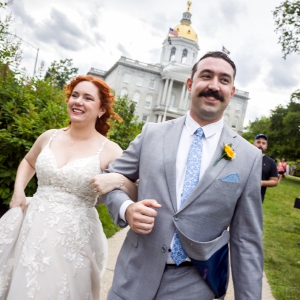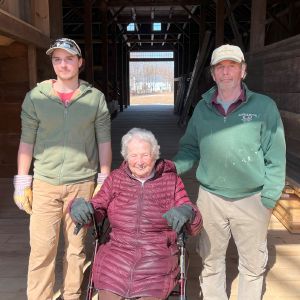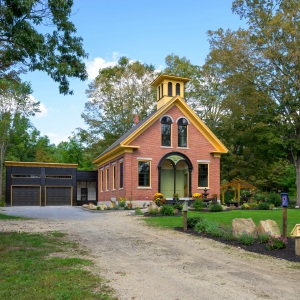A former star pitcher, his daughter and the reality that homelessness can happen to anyone
| Published: 05-05-2019 9:54 PM |
The young woman with the familiar last name was seated in the Friendly Kitchen, her eyes focused on her cellphone, hidden under shoulder-length blonde hair.
She’s homeless, short on money, her life stuffed into a knapsack, just like so many others who come to this place for a free meal. The kitchen is one of Concord’s humanitarian jewels, a place to not only eat but to avoid being judged by a public that doesn’t get it, that homelessness can happen to anyone.
The woman, named Allie Eckersley, moved her eyes off her cell, to me. We had met two days earlier, at a homeless camp hidden in the woods, when a pair of Concord cops were visiting encampments in the city. That day, they told her and her boyfriend they were trespassing on private property. They’d have to move on.
Unlike other homeless people I met that day in the woods, Allie gave me her full name and talked about homelessness in the city and what led to this point in her young life. She didn’t say much about her family, but her surname and its spelling had a familiar ring.
It’s the same last name as a Hall of Fame pitcher. And it says online that this pitcher – universally known as Eck – and his second wife, Nancy, have an adopted daughter together. Her name is Allie. She suffers from mental illness. She’s 22. The Allie I met looked about that age.
I had to go back, find out, so I approached Allie, finding her among the lunchtime crowd at the Friendly Kitchen, and asked. Yes, her father is indeed famous, she said. In fact, he’s really famous.
“Dennis,” Allie said, after I asked for her dad’s name.
Dennis Eckersley?
Article continues after...
Yesterday's Most Read Articles
 ‘Deep flavor’ – New restaurant in downtown Concord offers creative spin on comfort food and cocktails
‘Deep flavor’ – New restaurant in downtown Concord offers creative spin on comfort food and cocktails
 ‘Over-regulation is going to create sneakier kids’: Concord High students react to impending bell-to-bell phone ban
‘Over-regulation is going to create sneakier kids’: Concord High students react to impending bell-to-bell phone ban
 Photos: A Downtown ‘I Do’ at Market Days in Concord
Photos: A Downtown ‘I Do’ at Market Days in Concord
 Kenney family of Boscawen earns state preservation award for restoration of 19th-century barn
Kenney family of Boscawen earns state preservation award for restoration of 19th-century barn
 Concord receives federal funding to clean old stables, paving way for stagecoach museum
Concord receives federal funding to clean old stables, paving way for stagecoach museum
 Concord-area runners tackle Mt. Washington Road Race
Concord-area runners tackle Mt. Washington Road Race
Yep.
She spoke in a monotone voice, hushed, words sometimes mumbled. Her blue eyes lacked something, that feeling of hope or self-worth, of having something to look forward to.
Later, in our third conversation, over the phone, she set the ground rules for publication, that I have to carry her message, her potential solution, to this problem that plagues the city and beyond.
Then, and only then, could I reveal that Concord’s homeless community includes the daughter of one of the most beloved and recognizable celebrities in the sports world – make that any world – especially here in New England.
Allie wants to be a leader. She wants to put her life experience to work. First, though, she must manage her bipolar disorder and depression and anxiety, get them under control.
“I want to begin a homeless mental health awareness event,” Allie said. “Have it be like the telethon, or a carnival where you pay to get in, or a movie night and the money goes to a housing shelter.”
She knows all about this form of instability. It’s sudden or it’s gradual, but it lies in waiting. Lose your job, pay a giant medical bill, split from your significant other, suffer from mental illness, fall into the throes of addiction. All can lead in this direction.
Take your pick.
Allie is part of this crisis, an example of the small band of Concord’s population that lives in abandoned buildings and thick woods.
“In general, yes, people become homeless for many reasons, and for some people, the reasons are very complex and might involve mental illness, a history of trauma, substance abuse, or a combination of these things,” Ellen Groh, the executive director of the Concord Coalition to End Homelessness, explained in an email.
And yet Allie has ideas, goals, vision. She wants to go to college and join the medical field. She wants to be innovative, saying the homeless can do landscaping at a special facility, just for them, maybe paint walls, not pay rent. Maybe learn to garden. Maybe use funds to buy an abandoned building. Maybe bring the issue out of the woods, where it hides like a tent in the underbrush.
In short, crush the stigma. During my first meeting with Allie, in the still-bare woods behind the closed liquor store on Storrs Street, she waved me back after I had already interviewed her. She wanted me to understand something.
“These are our homes,” she said. “The only issue is that Concord looks at us like we’re scum. They don’t realize we’re human beings.”
That’s what Allie and professionals in the state want you to know. That anyone can become homeless, a living condition that doesn’t give a hoot what color you are, or what religion you are, or what your family’s savings account says.
“The hidden aspect of who her parents are, economically that plays a part in this and makes it a different story,” said Julie Green, a clinical caseworker for the Concord Coalition to End Homelessness.
Few knew about Allie’s background. Green did, but added that Allie “didn’t broadcast it.”
Her father earned more than $27 million in his baseball career, which lasted from 1975 through 1998.
He was unique, one of those rare pitchers who combined an impressive win total – 197 – through his years as a starting pitcher, with his impressive save total – 390 – connected to his years as a closer, the pitcher who receives more publicity than any other reliever because he enters the game late to preserve a lead. That’s when the spotlight is brightest.
Dennis spent eight seasons with the Red Sox. His high leg kick, sidearm delivery and long dark hair, plus the pistol-packing manner in which he fired his index fingers toward his latest strikeout victim, remain forever stamped in fans’ minds, at least those old enough to remember him.
He’s since carved out a nice career for himself doing color commentary for Red Sox games on NESN. He’s as cool as they come, youthful looking and handsome at age 64, still sporting his layered 1970s-style haircut and mustache, both silver now. He’s funny and articulate on the air, never stiff or stuffy.
And, to his credit, Eckersley never shied away from tough questions. He spoke openly about the breakup of his first marriage, and has remained open to speaking about the ninth-inning, two-run homer he allowed to a hobbled, pinch-hitting Kirk Gibson, ending Game 1 of the 1988 World Series on what is known as one of the most famous, dramatic and important home runs ever hit.
History says Gibson’s homer set the tone for the series. The Dodgers beat the Oakland Athletics in each of the next three games to claim the championship. History also says that one of the greatest closers of all-time got burned on national television.
But that was baseball, and Eckersley faced the press, faced the music, faced the fact that he had blown a big game. That was easy.
But this? His daughter, homeless and bipolar? The player known as a control artist, the reliever who once walked just four batters in 73 innings, suddenly had little control.
This is a subject dripping with perspective, a topic that puts baseball in its place, and one that Eckersley declined to address with me directly.
Instead, his current wife, Jennifer, emailed me.
“As you can imagine this is an incredibly private and painful situation,” she wrote. “Dennis and Nancy decline speaking to you about it, as it’s simply too painful. Instead, the family offers this statement:”
It read, in part: “As a family, we have been devoted to her health and wellbeing. We have given her unconditional love, nurturing and support. We have left no stone unturned in seeking the help, resources, programs and professionals she has needed throughout her life.
“Once she became of legal age our ability to intervene on her behalf became far more limited.”
Allie, who said her father lives in Ipswich, Mass., her mother in Sudbury, Mass., disputes the amount of love and support she received at home.
“He found a way to bring my homelessness in every single conversation,” she told me at the Friendly Kitchen. “What I’ve wanted my entire life is to be accepted by my own family. In my own home, I felt like an outsider, an outcast.”
Who knows?
Meanwhile, there are facts told by both sides that match up. Dennis and Nancy adopted Allie at birth. All she knows about her biological parents is that her father was controlling and mean to her mother, leading to the adoption. That’s it.
Soon, it was clear that something was wrong.
“At age two Allie was diagnosed with mental illness,” the Eckersley family statement read, “which worsened considerably through the years, leading to multiple hospitalizations and eventually institutionalization.”
Allie said she was in one facility or another from the age of 6 on. For mental health. For behavioral trouble. Even a lock-down hospital.
“When I was in Mass., before I moved up here, I didn’t learn from any of my mistakes,” Allie said. “I didn’t realize they were mistakes and that I had to admit that and take those responsibilities. They are mistakes that I don’t really want to mention.”
She came here to Concord with her boyfriend in January of last year. She slept in a tent her first winter, with a heater and cots. Sometimes she couch surfed. She told me she and her boyfriend have another campsite in mind, since police gave them a warning last weekend that it was time to leave.
“We’re moving,” Allie said. “They gave us a week.”
Allie wants her parents to realize that she’s moving forward, bettering herself. That’s what she claims. Her mind rolls over the same subject, that her parents, especially Dennis, never could nudge this homeless thing aside since she left 16 months ago.
Still, Allie added, it wasn’t all bad at home. Dennis and Nancy made an effort to attend their daughter’s events. They felt joy when she went to prom, sorrow when her boyfriend broke her heart.
“Those little things they did do that were good, I want them to outweigh the bad,” Allie said. “But somehow, they haven’t.”
She paused here, at the Friendly Kitchen, to wipe her eyes.
“Sorry” she said, “this is a tough subject for me.”
For everyone, in fact. You can feel it in the family statement.
“Our hearts are broken,” it read. “Unfortunately, in her situation, the issue is less about homelessness and more about mental illness. We continue to hope Allie seeks the mental health treatment she desperately needs so she can get her life back on track.”
Allie says she’s been accepted to two colleges, New Hampshire Technical Institute and Granite State College. She says she called her parents in February, the last time they spoke, to tell them about her school plans. She hoped for a more exciting response than she got.
Again, she claims, her parents saw only the part about being homeless. A tough fact to get past.
Elsewhere, Allie wants to work in the mental health field, give back, use her experience to help others.
“I want to be someone who people can relate to,” Allie said. “I want people to know there really is hope in the world, or there is someone who has gone through something similar to what they have gone through. I want them to see the progress I’ve made, that even in the roughest times, there is still hope that everything will be okay.”
She’s taking her meds. She’s got food stamps. She recently had her wisdom teeth out, making the appointment herself, getting to the dentist on her own, with no help from her parents. To Allie, that meant something, perhaps showing Dennis and Nancy that she’s able to care for herself, that she’s maturing, that she’s aware of her illness and trying her best to face it.
Green sees lots of promise, telling me, “Allie is a wonderful young lady who is suffering. She’s great at asking for help if her mental health is deteriorating.”
And one more thing. Allie wrote me an 11th-hour email, making sure I included another way in which she’s proved herself lately.
“Can you let them know I checked into a Riverbend supported emergency unit to get back on track,” the email read. “(I) was there two nights and left last night. Went there on my own.”
Let them know. Her thoughts are geared to the people who raised her, the people who wrote to me that Allie has seen “countless therapists, doctors, psychiatrists, neurologists and child health advocates.”
Maybe if they reunite, Allie won’t let it bother her as much when autograph- and selfie-seekers interrupt the family while dining at a restaurant.
In a sense, Allie wants to set an example, be a role model, open eyes and minds and hearts about mental illness and homelessness. She wants the public to know that this scenario, alive and well in Concord, knows no bounds.
“Money doesn’t matter,” she said. “Homelessness can happen to anyone.”
Her parents have their own message. They miss Allie. They love her.
“I know they do,” Allie said. “But I don’t want to take the easy way out just because I want a home and an education.”
Then she paused. Her father came to mind.
“Maybe,” she said, “I’ll just give him a call.”
]]>







 Around Concord: Living in an 1856 schoolhouse is (mostly) delightful
Around Concord: Living in an 1856 schoolhouse is (mostly) delightful Granite Geek: The circle of life is painful when watching the species-gets-killed part
Granite Geek: The circle of life is painful when watching the species-gets-killed part Concord’s two Rite Aid stores shutting soon
Concord’s two Rite Aid stores shutting soon
